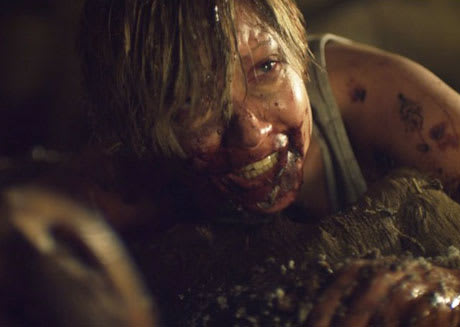Building on the aesthetic and style of his 1999 co-directorial debut, The Blair Witch Project, Eduardo Sanchez rehashes the handheld, digitized, shaky-cam chaos that has unfortunately become the status quo for the modern spook-fest, expanding on our cultural preoccupation with surveillance and sensationalized voyeurism ("reality" TV).
Here, he justifies the style by mixing it with standard, if washed-out and dreary, film footage, using the interviews and night vision histrionics as an objective eye, one free from the potential psychological skew of character perspective.
Said perspective is that of newlywed Molly (Gretchen Lodge), a recovered drug addict and child abuse survivor whose decision to move into her childhood abode, which has been long-boarded up since the death of her monstrously constructed, but never seen, daddy, proves instantly problematic when bumps in the night lead to panicked 911 calls.
We're given a sense of Molly's unease early on with flash-forwards to suicide attempts and stilted confessions to her oft-absent trucker husband, Tim (Johnny Lewis), shifting the perspective from haunted house narrative to an examination of psychological deterioration between film styles, which is heightened by the alienating, ambient rumbling of Tortoise's score.
Ignoring some of the plot holes that arise from a narrative that exploits discomfort by manipulating the gaze – even that of traditional female passivity, with Molly's distorted sexuality acting as an ersatz audience punishment for objectification – the handling of the standard "is she crazy or is the house haunted?" dynamic works, for the most part. It's just unfortunate for male viewers that the impetus of mental deterioration as a proponent for identity deconstruction is that of a resentment of superficial, oft-subjugating male desires.
As the film progresses and increased grotesquery compounds, such as a drunken, messy flirtation with a pastor as a self-actualized reiteration of inner-ideology, proving to Molly that all men are indeed dogs, this assertion of female identity as a response to repeat objectivity propels the story. The only stabilizing force comes from her relationship with her somewhat sane white trash sister, Hannah (Alexandra Holden), whose parental mediator role helps ground, and prolong, Molly's encounter with worldly and otherworldly horror.
While this trajectory of female rage may alienate male viewers either unimpressed with the overt criticism of their eye or confused by the lack of straightforward narrative propulsion, it would be glib to dismiss what Sanchez constructed, which is that of a genre deconstruction in itself and a sly "fuck you" to perverted fan boys everywhere.
(Mongrel Media)Here, he justifies the style by mixing it with standard, if washed-out and dreary, film footage, using the interviews and night vision histrionics as an objective eye, one free from the potential psychological skew of character perspective.
Said perspective is that of newlywed Molly (Gretchen Lodge), a recovered drug addict and child abuse survivor whose decision to move into her childhood abode, which has been long-boarded up since the death of her monstrously constructed, but never seen, daddy, proves instantly problematic when bumps in the night lead to panicked 911 calls.
We're given a sense of Molly's unease early on with flash-forwards to suicide attempts and stilted confessions to her oft-absent trucker husband, Tim (Johnny Lewis), shifting the perspective from haunted house narrative to an examination of psychological deterioration between film styles, which is heightened by the alienating, ambient rumbling of Tortoise's score.
Ignoring some of the plot holes that arise from a narrative that exploits discomfort by manipulating the gaze – even that of traditional female passivity, with Molly's distorted sexuality acting as an ersatz audience punishment for objectification – the handling of the standard "is she crazy or is the house haunted?" dynamic works, for the most part. It's just unfortunate for male viewers that the impetus of mental deterioration as a proponent for identity deconstruction is that of a resentment of superficial, oft-subjugating male desires.
As the film progresses and increased grotesquery compounds, such as a drunken, messy flirtation with a pastor as a self-actualized reiteration of inner-ideology, proving to Molly that all men are indeed dogs, this assertion of female identity as a response to repeat objectivity propels the story. The only stabilizing force comes from her relationship with her somewhat sane white trash sister, Hannah (Alexandra Holden), whose parental mediator role helps ground, and prolong, Molly's encounter with worldly and otherworldly horror.
While this trajectory of female rage may alienate male viewers either unimpressed with the overt criticism of their eye or confused by the lack of straightforward narrative propulsion, it would be glib to dismiss what Sanchez constructed, which is that of a genre deconstruction in itself and a sly "fuck you" to perverted fan boys everywhere.




